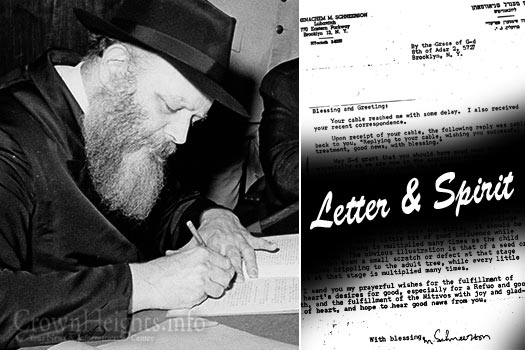
Letter & Spirit: Depression vs. Bitterness
In this week’s edition of Letter & Spirit, we present a letter of the Rebbe in which he explains the difference between negative feelings that are productive, and those that are destructive. The letter was written through the Rebbe’s trusted secretary Rabbi Nissan Mindel, and was made available by his son-in-law Rabbi Sholom Ber Shapiro.
In preparing for Rosh Hashanah – doing a cheshbon hanefesh and teshuvah – one can easily succumb to negative feelings. Which are positive and productive and which are negative and detrimental? The Rebbe explains the difference between depression (atzvus) and bitterness (merirus).
This new weekly feature is made possible by a collaboration between CrownHeights.info and Nissan Mindel Publications. Once a week we will be publishing unique letters of the Rebbe that were written originally in the English language, as dictated by the Rebbe to Rabbi Mindel.
**********
By the Grace of G-d
Erev Succos, 5736
Brooklyn, N.Y.
Miss
Wilmington, N.C.
Blessing and Greeting:
Your letter reached me with considerable delay. In it you write about your background, and sense of confusion, etc.
From your writing I gather that you are acquainted to some extent with Jewish philosophy. At any rate, I hope you have seen the Chabad classic, the Tanya, of which there is also an English translation. In it you will find a fairly lengthy discussion on various states of mind that may trouble a person. The gist of this is- how, and why, a person should not be discouraged by such moods and should not allow himself to lapse into a state of depression – atzvus, since this is contrary to avodas Hashem, which must always be with complete joy. He explains that atzvus inhibits energy and vitality, which are also indispensible ingredients of Divine service.
It is there further explained that if atzvus is brought on by a feeling of guilt for some undesirable action in the past, there is a legitimate outlet in merirus, and he goes on to explain the basic difference between the two states in that merirus is energizing, inducing an inner urge to rectify the past and improve the future, whereas atzvus is paralyzing, inducing depression and inertia; hence it must be ruled out completely.
I suggest you study this topic in the Tanya and it will surely give you the proper perspective.
By hashgacha pratis your letter reached me during the Ten Days of Teshuva of which it is written, “Seek G-d when He is found, call Him when He is near,” as our Rabbis explain. Significantly, this period is followed by the “Season of our Rejoicing.” Such is the feeling of relief and joy, after teshuva, in the light of the said discourse in the Tanya. Even if you do not fully grasp it as yet, I trust you will nevertheless dismiss any feeling of atzvus from your mind and apply yourself energetically to fostering Yiddishkeit in yourself and your surroundings, with greater dedication than before.
Wishing you a happy and inspiring Yom Tov,
With blessing,
**********
The above letter is from the archives of Rabbi Dr. Nissan Mindel, a personal secretary to the Previous Rebbe and The Rebbe, whose responsibilities included the Rebbe’s correspondence in English.
Many of the letters are now being published in The Letter and the Sprit, a series of volumes by Nissan Mindel Publications.
We thank Rabbi Sholom Ber Shapiro, director of Nissan Mindel Publications and the one entrusted by Rabbi Mindel, his father-in-law, with his archives, for making these letters available to the wider public. May the merit of the many stand him in good stead.












